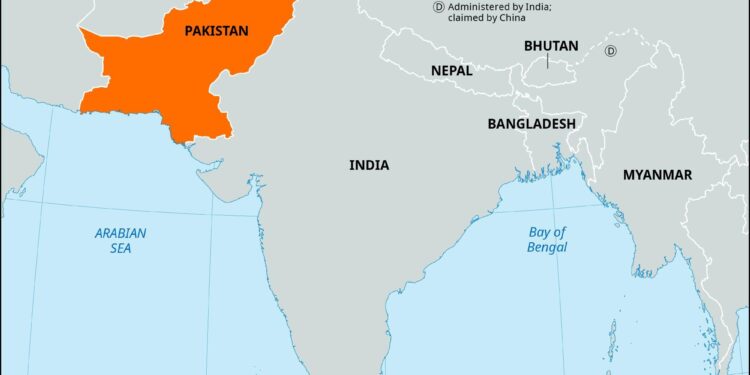In a significant development aimed at bolstering economic ties, Pakistan and Kazakhstan have entered discussions to explore joint ventures that would enhance trade connectivity through the strategic ports of Karachi and Gwadar. As both nations seek to diversify their trading partnerships and expand their markets, this collaboration is poised to harness the potential of Pakistan’s logistical infrastructure and Kazakhstan’s resource-rich economy. With shared interests in regional stability and economic growth, the dialogue underscores a commitment to fostering bilateral trade relations and facilitating smoother access to key maritime routes. As the landscape of international commerce continues to evolve, the outcomes of these discussions could pave the way for a new era of trade collaboration between Central Asia and South Asia.
Pakistan and Kazakhstan Explore Strategic Partnerships for Enhanced Trade Connectivity
The recent discussions between Pakistan and Kazakhstan mark a significant leap towards fostering economic ties and enhancing trade corridors between the two nations. With a focus on utilizing the strategic locations of Karachi and Gwadar ports, both countries are looking at joint ventures that could increase the flow of goods and services, benefiting their economies. The talks emphasize collaboration in areas such as logistics, transportation, and infrastructure development, which are pivotal for improving trade connectivity across Central and South Asia. Stakeholders from both sides expressed optimism about tapping into mutual strengths to streamline border processes and reduce logistical bottlenecks.
To further consolidate these efforts, a roadmap is being proposed that outlines essential action points and deadlines. This plan aims to facilitate bilateral trade and establish a framework for prioritized sectors including energy, agriculture, and textiles. Key initiatives also include conducting feasibility studies for direct shipping routes and setting up trade missions to explore investment opportunities. A preliminary budget allocation is being discussed, focusing on incentives for businesses willing to engage in cross-border commerce. Below is a summary of the key sectors being targeted for joint investment:
| Sector | Focus Areas | Investment Potential |
|---|---|---|
| Energy | Renewable resources, oil & gas | High |
| Agriculture | Food processing, exports | Medium |
| Textiles | Fabric production, apparel | High |
Optimizing Karachi and Gwadar Ports: A Pathway for Economic Cooperation
The recent discussions between Pakistan and Kazakhstan mark a significant turning point in fostering economic collaboration through the strategic utilization of Karachi and Gwadar ports. By enhancing port operations and infrastructure, both nations aim to establish a robust supply chain that facilitates the efficient movement of goods, thereby unlocking new trade avenues. Key strategies include:
- Investment in Infrastructure: Upgrading existing facilities to accommodate larger vessels and increasing cargo capacity.
- Streamlined Customs Processes: Implementing digital solutions to expedite clearance times.
- Joint Shipping Ventures: Exploring opportunities for shared shipping routes to reduce costs and enhance connectivity.
Moreover, the creation of a collaborative framework can pave the way for a seamless exchange of goods between Central Asia and South Asia. Both governments are optimistic that tapping into each other’s markets will not only increase trade volume but also diversify the types of commodities exchanged. A comparative overview of potential trade benefits is illustrated in the table below:
| Country | Export Potential | Import Needs |
|---|---|---|
| Pakistan | Agricultural products, textiles | Energy resources, machinery |
| Kazakhstan | Minerals, agricultural products | Textiles, consumer goods |
Recommendations for Strengthening Bilateral Trade Relations between Pakistan and Kazakhstan
To enhance the trade dynamics between the two nations, it is essential to establish a multifaceted approach. Key recommendations include:
- Facilitating regular trade delegations to explore opportunities and identify potential sectors for collaboration.
- Developing a joint task force focused on trade agreements that simplify customs procedures and reduce tariffs.
- Encouraging partnerships in sectors such as energy, agriculture, and technology, capitalizing on each country’s strengths.
- Utilizing the strategic location of Karachi and Gwadar ports to optimize trade routes and logistics services.
Moreover, it is critical to introduce initiatives aimed at public-private partnerships to foster investment in joint ventures. Strategies may include:
- Hosting trade exhibitions and business forums that connect entrepreneurs and investors from both countries.
- Providing financial incentives for businesses engaged in bilateral projects, particularly in emerging sectors.
- Enhancing information exchange regarding market demands, potential challenges, and success stories from both nations.
Key Takeaways
In conclusion, the discussions between Pakistan and Kazakhstan mark a significant step towards enhancing bilateral trade relations through the strategic utilization of the Karachi and Gwadar ports. As both nations seek to capitalize on their geographical advantages and complementary economic strengths, these joint ventures could pave the way for increased investment and a more diversified trade portfolio. With Kazakhstan looking to expand its regional influence and Pakistan aiming to unlock its port potential, this collaboration could play a pivotal role in bolstering trade links across Central and South Asia. Stakeholders from both countries are optimistic that this partnership will not only boost economic ties but also contribute to the overall stability and prosperity of the region. As developments unfold, the business communities and governments of both nations will be closely monitoring the progress of these initiatives.














